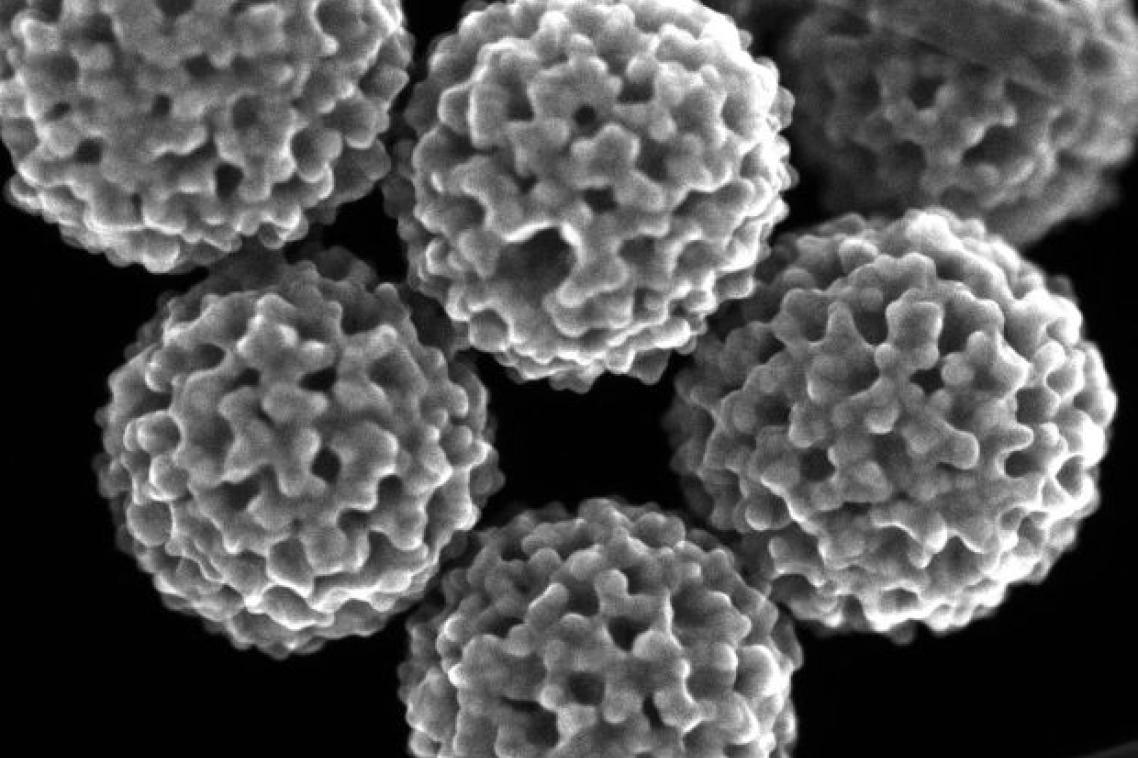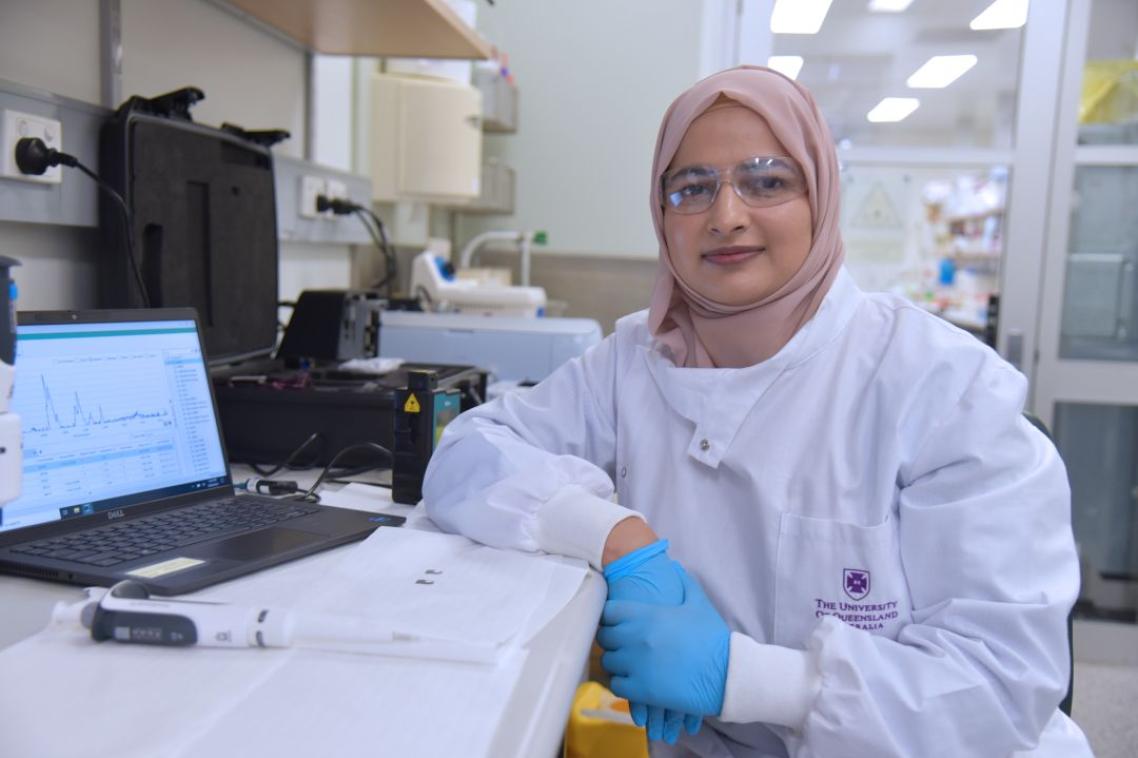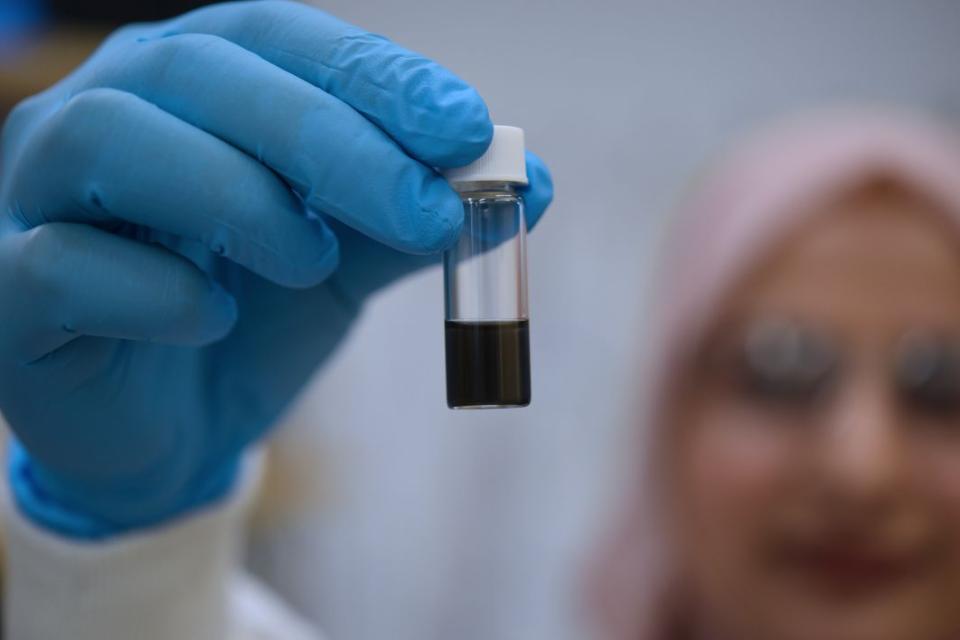Sponge-like gold particles could upgrade ovarian cancer diagnostics

Mesoporous gold nanoparticles can be used highlight faint ovarian cancer markers in samples like urine, saliva, or blood.
(Photo credit: The University of Queensland )
Key points
- Specially designed gold nanoparticles can be used to highlight ovarian cancer markers in samples of urine, saliva, or blood
- The mesoporous gold structures act as tiny light amplifiers that reveal even the faintest traces of ovarian cancer in a patient sample
- UQ researchers hope to use gold to improve diagnostic tools and, ultimately, survival rates for a cancer that is considered particularly deadly
A gilt-edged project led by University of Queensland PhD student Javeria Bashir has produced specially crafted gold nanoparticles that can highlight cancer markers in samples like urine, saliva, or blood.
Ms Bashir said she hoped to use her gold nanoparticles to help improve survival rates for a cancer that is considered particularly deadly.
“Ovarian cancer rarely shows clear symptoms in its early stages, and diagnosis is often complex, Ms Bashir said.
“Current approaches make it difficult to accurately triage and identify women with ovarian cancer compared to those with benign conditions, often requiring painful and invasive procedures such as tissue biopsy.
“To me, this creates an unacceptable situation for women. At present, there is no effective and accessible test to accurately identify ovarian cancer and prevent women from undergoing unnecessary procedures.”

UQ nanomaterials researcher Javeria Bashir.
(Photo credit: The University of Queensland )
Gold-enhanced light sensors
Guided by experts from UQ’s School of Mechanical and Mining Engineering - in collaboration with the Australian Institute for Bioengineering and Nanotechnology (AIBN), UQ Centre for Clinical Research (UQCCR), and UQ Centre for Extracellular Vesicle Nanomedicine - Ms Bashir sought to improve cancer diagnostics by using the unique biosensing capabilities of sponge-like mesoporous gold nanoparticles.
Working at scales of a billionth of a metre, Ms Bashir was able to boost the sensitivity of gold-enhanced light sensors using a technique called Surface-Enhanced Raman Scattering (SERS).

Mesoporous gold nanoparticles have unique biosensing capabilities.
(Photo credit: The University of Queensland)
“SERS platforms are already highly sensitive and can detect biomarkers at the nanoscale,” Ms Bashir said.
“Using mesoporous gold nanoparticles increased that sensitivity even further compared to nonporous, or commercially available nanoparticles.
“Essentially, the gold particles act like tiny light amplifiers, creating hotspots that reveal even the faintest traces of cancer.”
Ms Bashir said the gold could be embedded in the diagnostic process with a small tube to hold the patient sample and a handheld Raman spectrophotometer.
This combination has already been used to outperform current blood tests, achieving 82 per cent sensitivity in confirming ovarian cancer and 98 per cent specificity in ruling it out.
Helping women in remote communities
Ms Bashir said the portability, simplicity, and affordability of this sensor technology would be particularly beneficial for women in remote or under-resourced regions.
“This project demonstrates how mesoporous nanotechnologies can help us transform disease monitoring and pave the way for personalised treatment strategies,” Ms Bashir said.
“Devices like this are moving closer and closer to everyday use.”
The research was published in the nanoscience and nanotechnology journal Small.
Collaboration and acknowledgements
The project was conducted under the supervision of UQ Associate Professor Md Shahriar A. Hossain, Dr Mostafa Kamal Masud, Professor Yusuke Yamauchi and Professor Carlos Salomon, who provided conceptual and clinical support. Further contributions came from the Mater Research Institute and Oregon Health & Science University.Related articles
Pots of gold engineered to help with early disease detection
License agreement creates golden opportunity for cancer diagnostic technology
Media contact
UQ Communications
communications@uq.edu.au
+61 429 056 139
